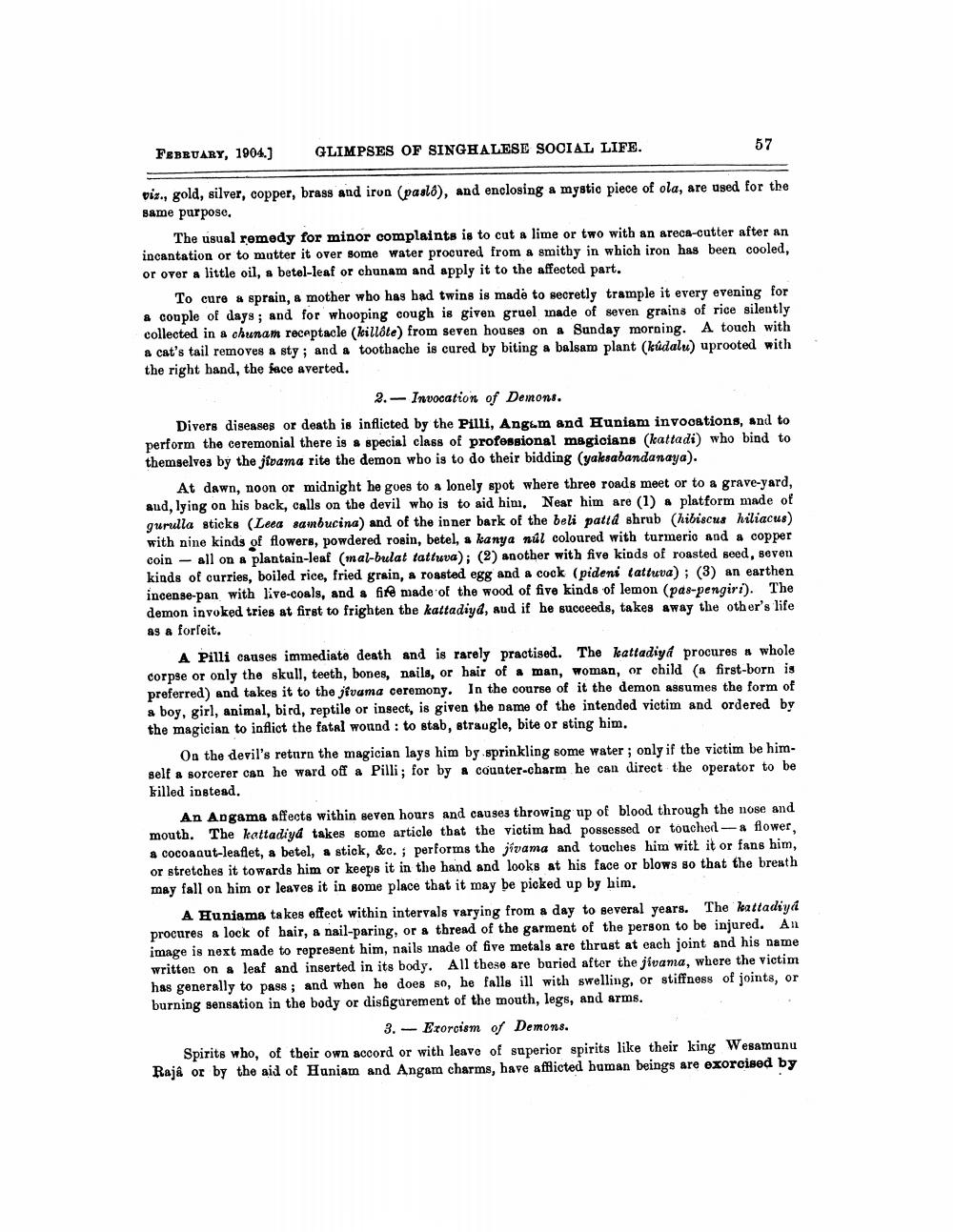________________
57
FEBRUARY, 1904.]
GLIMPSES OF SINGHALESE SOCIAL LIFE.
viz., gold, silver, copper, brass and iron (pasló), and enclosing a mystic piece of ola, are used for the
same purpose.
The usual remedy for minor complaints is to cut a lime or two with an areca-cutter after an incantation or to mutter it over some water procured from a smithy in which iron has been cooled, or over a little oil, a betel-leaf or chunam and apply it to the affected part.
To cure a sprain, a mother who has had twins is made to secretly trample it every evening for a couple of days; and for whooping cough is given gruel made of seven grains of rice silently collected in a chunam receptacle (killôte) from seven houses on a Sunday morning. A touch with a cat's tail removes a sty; and a toothache is cured by biting a balsam plant (kúdalu) uprooted with the right hand, the face averted.
2.Invocation of Demons.
Divers diseases or death is inflicted by the Pilli, Angam and Huniam invocations, and to perform the ceremonial there is a special class of professional magicians (kattadi) who bind to themselves by the jivama rite the demon who is to do their bidding (yaksabandanaya).
At dawn, noon or midnight he goes to a lonely spot where three roads meet or to a grave-yard, aud, lying on his back, calls on the devil who is to aid him, Near him are (1) a platform made of gurulla sticks (Leea sambucina) and of the inner bark of the beli patta shrub (hibiscus hiliacus) with nine kinds of flowers, powdered rosin, betel, a kanya nil coloured with turmeric and a copper coin all on a plantain-leaf (mal-bulat tattuva); (2) another with five kinds of roasted seed, kinds of curries, boiled rice, fried grain, a roasted egg and a cock (pideni tattuva); (3) an earthen incense-pan with live-coals, and a fire made of the wood of five kinds of lemon (pas-pengiri). The demon invoked tries at first to frighten the kattadiyd, and if he succeeds, takes away the other's life as a forfeit.
seven
A Pilli causes immediate death and is rarely practised. The kattadiyá procures a whole corpse or only the skull, teeth, bones, nails, or hair of a man, woman, or child (a first-born is preferred) and takes it to the jivama ceremony. In the course of it the demon assumes the form of a boy, girl, animal, bird, reptile or insect, is given the name of the intended victim and ordered by the magician to inflict the fatal wound: to stab, straugle, bite or sting him.
On the devil's return the magician lays him by sprinkling some water; only if the victim be himself a sorcerer can he ward off a Pilli; for by a counter-charm he can direct the operator to be killed instead.
An Angama affects within seven hours and causes throwing up of blood through the nose and mouth. The kattadiyá takes some article that the victim had possessed or touched-a flower, a cocoanut-leaflet, a betel, a stick, &c. ; performs the jivama and touches him with it or fans him, or stretches it towards him or keeps it in the hand and looks at his face or blows so that the breath may fall on him or leaves it in some place that it may be picked up by him,
A Huniama takes effect within intervals varying from a day to several years. The kattadiyá procures a lock of hair, a nail-paring, or a thread of the garment of the person to be injured. An image is next made to represent him, nails made of five metals are thrust at each joint and his name written on a leaf and inserted in its body. All these are buried after the jivama, where the victim has generally to pass; and when he does so, he falls ill with swelling, or stiffness of joints, or burning sensation in the body or disfigurement of the mouth, legs, and arms.
3. Exorcism of Demons.
Spirits who, of their own accord or with leave of superior spirits like their king Wesamunu Raja or by the aid of Huniam and Angam charms, have afflicted human beings are exorcised by




